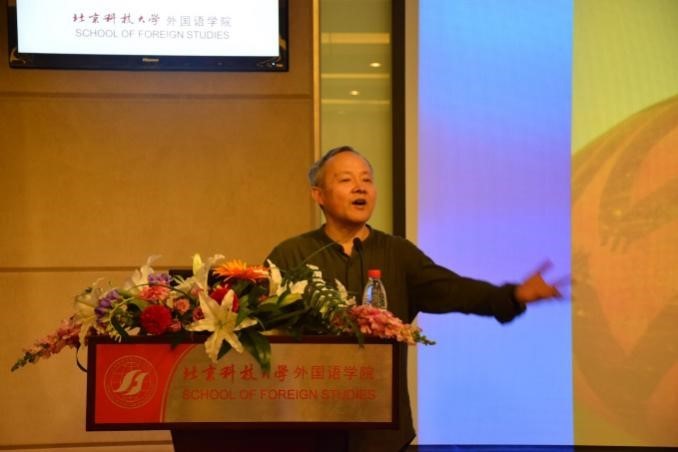The Anthropological Turn in the International Humanities

On the morning of May 29, 2019, Prof. Ye Shuxian, a senior professor of Shanghai Jiao Tong University and a researcher of the Chinese Academy of Social Sciences, gave a lecture entitled “Anthropological Turn in the International Humanities” in Room 315 of the SFS Building. The lecture was introduced by Mrs. Chen Hongwei, Dean of the School of Foreign Studies (the SFS), and concluded by Mr. Fan Yiting, Director of the English Department. The participants included young teachers, doctoral and postgraduate students, some undergraduates, and students from other schools.

At the beginning of the lecture, Prof. Chen Hongwei gavean impressive introduction to Prof. Ye’s academic career and published research. Mr. Ye is an academic leader of the China Multi-Million Talent Project and has created a new interdisciplinary discipline of literary anthropology in China. He was the editor-in-chief of the “20th Century Foreign Literature Series”, “the Anthropological Decipherment of Chinese Culture Series”, “ Literary Anthropology Series” and “ the History of Mythology Series”. He has also published more than 30 books, including The Philosophy of Chinese Mythology, The Cultural Interpretation of the Poetry Sutra, The Cultural Analysis of Zhuangzi, Laozi and Mythology, Bear Totem: Exploring the Origin of Chinese Ancestral Mythology, The Crisis of Modernity and the Search for Cultural Roots, Course on Literary Anthropology, The Thousand-Faced Goddess, Yale Notes, The Mysterious Numbers of Ancient China, The Cultural Search for Classic of Mountains and Seas, etc. His books have been translated and published in many languages, including Japanese, Korean, English, French, etc.
In this lecture, Mr. Ye Shuxian led the students to understand cultural anthropology and literary anthropology within the context of a larger discipline of anthropology. First, he gave a brief introduction to the development of anthropology. Anthropology originated in the 19th century and developed in the 20th century, which focuses on the scientific study of human beings, human behavior, and human society. It is mainly divided into two categories, physical anthropology and cultural/social anthropology. The former studies the biological development of human beings as primates, while the latter studies the norms and values of human society. On that basis, Mr. Ye explained the worldwide development of literary anthropology as well as the theories and practices of literary anthropology put forward by Chinese scholars with reference to our cultural background.
Mr. Ye suggested that the shift of anthropology was the most important academic paradigm change after the shift of linguistics in the last half-century. Cultural anthropology would lead the development of all humanities. At the end of the 19th century and the beginning of the 20th century, James Frazer triggered the globalization of cultural knowledge with his masterpiece of comparative mythology/religion, The Golden Bough, which expanded the horizon of research on humanities. After a century of development, three popular works emerged in literary anthropology, Guns, Germs, and Steel (by Jared Diamond, Ph.D. in biology), Big History (by David Christian, Ph.D. in history), and A Brief History of Mankind (by Yuval Herrari, Ph.D. in history). A review of the academic genealogy of these three bestsellers could reveal that they all belong to cross-cultural cultural anthropology that breaks disciplinary boundaries. Under the influence of the international trend of “big history”, scholars in China have also proposed the localized concept of “big tradition”.
Literary anthropology, as an emerging discipline at the intersection of Chinese literary disciplines and cultural anthropology, focuses on the relationship between literature and culture. Mr. Ye’s research focuses on mythology , the best combination of anthropological knowledge and literary studies. -.
In 1932, Mr. Zheng Zhenduo published “Tang Dao Pian”, which initiated the study of literary anthropology in China. Since the 1980s, scholars have begun to translate and apply the theory of mythological archetypal criticism and led to the development of China’s literary anthropology. In 1996, the Chinese Institute of Literary Anthropology was founded, which began a new stage of literary anthropology studies. Since 2010, Chinese scholars have proposed the concept of the great tradition and the fourfold evidence method, which provides a methodology for the integration of multidisciplinary knowledge. The theory of big and small traditions takes written traditions as “small tradition” and unwritten traditions as “big tradition”. Big and small traditions run through prehistory and civilization, providing a new cultural perspectivethat the theory regards the codes of big tradition consisting of artifacts and images as primary codes and the codes of the small tradition of hieroglyphic Chinese characters as secondary codes, the early classics written in Chinese characters as tertiary codes. All written texts which cannot be exhausted from the classical era to the present and to the future are nothing but recoded, collectively known as N-level codes. Mr. Ye explained the four-pronged evidence method as follows. The first-pronged evidence refers to handed-down documents; the second-pronged evidence refers to newly unearthed written materials (oracle bones, gold, bamboo, stone carvings, etc.); the third-pronged evidence refers to living folk cultures such as oral traditions and intangible heritage, and the fourth-pronged evidence refers to cultural artifacts and images. They are cross-referenced and tested against each other, breaking through the limitation of traditional Chinese studies which relies solely on handed-down documents, and constructing a three-dimensional cultural text with multiple perspectives.
During the Q&A session, Mr. Fan Yiting commented on this lecture with two words, “magnificent” and “enlightening”. Following this session, graduate students from History of Science and Technology, English Literature, and other majors raised their questions, which were all well answered by Mr. Ye.
Students said they had benefited a lot and realized that the new trend in literary studies would no longer be confined to the narrow study of literary texts, but would be a broader study from interdisciplinary and cross-cultural perspectives, which would become a significant guide for their study and reading in the future.
